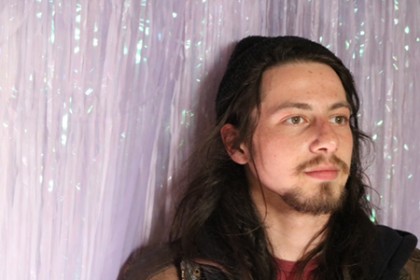Jazz musician and composer Jarrett Gilgore debuts two projects this month that grew out of his time in the Peabody Institute's jazz program—a study of the music of the late alto saxophonist Jimmy Lyons, and a commission to compose a new work to be a part of the Redlining Baltimore speaker series.

Image caption: Jarrett Gilgore
Image credit: Jon Birkholz
His commissioned work, "A Baltimore Requiem," debuts Wednesday at the speaker series installment titled Experience: Public Health and the Redline, hosted by actress Sonja Sohn and sponsored by JHU's 21st Century Cities Initiative. The event, which will take place at the Reginald F. Lewis Museum of African American History and Culture, includes Richard Best, founder of the Section 1 art nonprofit; Lawrence Brown, an assistant professor in Morgan State University's School of Community Health & Policy; Debra Furr-Holden, deputy director of the Johns Hopkins Center for the Prevention of Youth Violence; and Sonia Sarkar, the Baltimore City Health Department's Chief Policy and Engagement Officer.
Gilgore's composition, a roughly seven-minute electronics and alto saxophone duet with Baltimore MC Eze Jackson, precedes the speakers.
At first, Gilgore was unsure about writing a musical response to accompany a discussion of redlining in Baltimore and the city's legacies of discrimination.
"Initially when I was asked I felt a little uncomfortable about accepting the commission," he says. "First of all, writing instrumental music about something as important and raw and visceral as the death of Freddie Gray and what happened last April, I think, is just difficult in itself. I also felt strange not being from here and being a privileged, white Jewish kid from the suburbs."
Like many Peabody students, Gilgore lived near its Mount Vernon campus when he first moved to Baltimore; when he moved in with other musicians off Greenmount Avenue, he saw a different side of the city.
"Living here for five years has changed my perspective on a lot of things," he says. "I live in Pen Lucy on Greenmount Avenue, and that's a perfect example of a redlined neighborhood. You have the Guilford mansions and then the dead-end streets that don't connect to it. And just by living there I am being a participator in this gentrification process. So I thought that should be explored, and I decided to enlist the help of my friend Eze."
Jackson is a Baltimore-born and -raised MC, activist, and community organizer who has consistently interwoven his political ideas into his music, whether it be in the avant-leaning hip-hop band Soul Cannon he fronted or on a recent cover of Marvin Gaye's "Inner City Blues" with Baltimore power trio Black Lung, for which Jackson penned a blistering, Baltimore-centric new verse. Gilgore's "Requiem" taps into a similar awareness, incorporating a few field recordings he made from local anti-police brutality protests last April and a sample of poet Amiri Baraka reciting "Black Art" with saxophonist Albert Ayler, trumpeter Don Cherry, and drummer Sonny Murray, from Murray's 1965 album, Sonny's Time Now.
Gilgore composed "A Baltimore Requiem" in the computer music sequencer/workstation Ableton Live, and it's backbone is a rhythmic, electronic rustle and groove over which Jackson raps about growing up and living in Baltimore pre- and post uprising:
Police and politicians break laws every day
And I'm tryna convince my students calm down and follow rules?
Please, violence is embedded every year when u marketing Call of Duty to children living in fear
So miss me with the talk that you never was tryna hear before the news cameras and culture vultures was all in here.
Gilgore's research into the music of Jimmy Lyons, funded by a Provost's Undergraduate Research Award, will be performed April 26 at the Glass Pavilion. Lyons was an alto saxophonist who played in free-jazz pianist Cecil Taylor's bands from 1961 until Lyons' death in 1986, and he only released on a handful of albums as a bandleader himself. Gilgore says his father, a jazz pianist by hobby, first exposed him to Lyons' music when he was 14, through Taylor's 1966 album Conquistador!
"I initially wasn't into the music because like a lot of jazz musicians, especially alto saxophonists, until they can play bebop there's this kind of resentment of the talent of Charlie Parker," Gilgore says. "And Jimmy Lyons' sound is coming right out of Charlie Parker and I pushed that away until I could really understand the harmony of what was happening. In 2013, I was on a duo tour with a trumpet player who lived here for a bit, Jamie Branch, and she had a bunch of Jimmy Lyons records we were listening to and that rekindled my interest in it."
In 2013 he started to transcribe Lyons' music as bandleader from the early 1970s through the mid 1980s. He formed a band, Words Are Not Enough, with New York drummer Deric Dickens, another Lyons fan. They put together a quintet and recorded Streams, an album of Lyons' music and Gilgore's and Dickens' own compositions inspired by Lyons, which they released last summer.
Lyons never became as well-known as other alto saxophonists of the exploratory 1960s and '70s jazz, particular Eric Dolphy and Ornette Coleman, so he's a less written about figure from that era. With his PURA funds, Gilgore was able to interview a few of Lyons collaborators, such as bassist William Parker and saxophonist Bobby Zankel.
"The content of [Lyons'] music is rooted in bebop, so it's less like Ornette Coleman where he's not using any forms or structures," Gilgore says. "Jimmy Lyons is still using these melodic structures within his own improvisational voice. His tone is the biggest thing that cries out to me. And hearing Cecil Taylor with a saxophonist? As a saxophonist, when I try to play with Cecil Taylor records, it's very difficult, but Jimmy Lyons weaves around in the cracks really well. They had a really deep relationship."
Gilgore's Heart of the Ghost trio, featuring bassist Luke Stewart and drummer Ian McColm, plays the music of Jimmy Lyons April 26 at Levering Hall's Glass Pavilion on JHU's Homewood campus as part of the PURA Poster Session and Recognition Ceremony.
Posted in Arts+Culture
Tagged jazz, redlining baltimore









